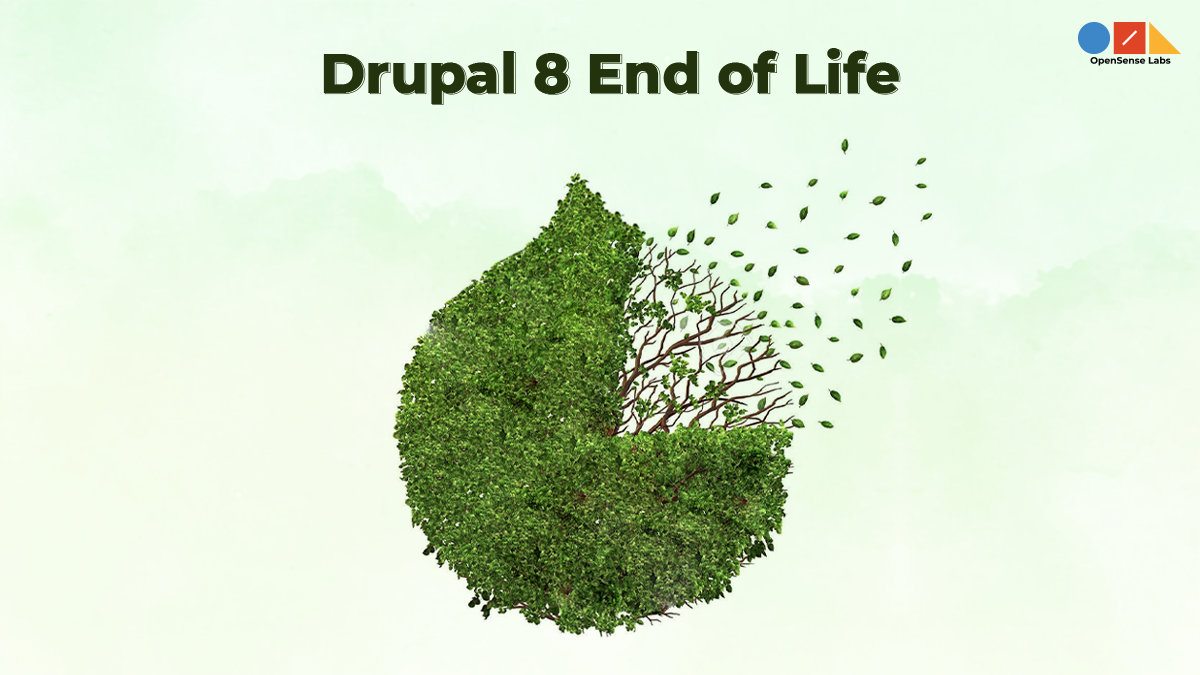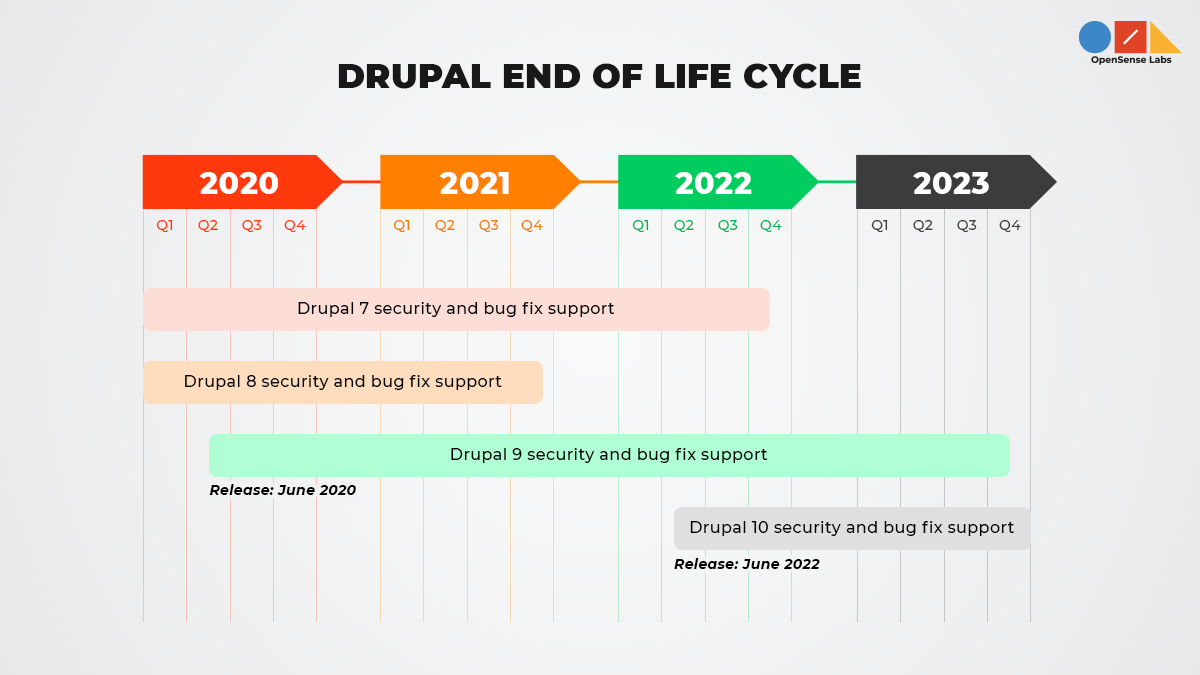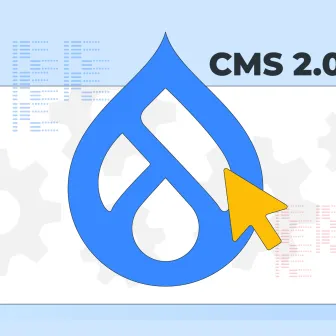Drupal 8 was launched on November 19, 2015 to support the Drupal community with advanced features and functionalities. But now there is only three months left for it’s end-of-life (EOL) since we already have the end date fixed i.e. November 2nd, 2021. Well, what does Drupal end of life mean? End of life basically is the official date after which Drupal Community stops supporting a certain version of Drupal. This article can be considered as a guide where we will be able to clear all our queries in regards to Drupal 8 end-of-life (EOL).

Why November 2nd, 2021 marks end of life for Drupal 8?
As we have discussed above, Drupal 8's end-of-life is just a few months away, so are we making our necessary plans for migrating to Drupal 8’s later version? Let us get into a little more detail about Drupal 8’s end-of-life as it will help you in taking any major decisions about the migrating process. So, basically, after November 2nd, 2021, the end date of Drupal 8 version, no security patches will be available to you and along with that you won’t be receiving any vendor extended support program for Drupal 8.
You will be surprised to know that Drupal 8’s End of Life happens before Drupal 7. Since, now you have an idea about Drupal 7 and 8 end of life, let us now look into the reasons why Drupal 8’s end of life takes place before Drupal 7. The first reason is that there was not much effort needed in the transition from Drupal 8 to Drupal 9. Since, Drupal 9 was not a reinvention of Drupal but rather it consists of two major differences i.e. updated dependencies and deprecating APIs. Second, Drupal 8 is majorly dependent on Symfony 3 and Symfony 3’s end of life is November 2021.
Is it still safe to stay on Drupal 8 even if the end of life is approaching?
If you decide to stay on Drupal 8 even after it’s end-of-life then you will have to go through some difficult consequences. Your website has to be compromised in terms of the security as the community support finishes with Drupal 8 end-of-life. You will have to purchase a vendor extended support program for Drupal 8 instead of depending upon the Drupal community to identify exploits and release patches. Additionally, as the developer community will no longer prioritize on enhancing the Drupal 8 version, so consequently, the existing modules will not receive any further necessary updates from the community as they will be busy focusing on Drupal 9 modules. Let me also tell you that with the growing time Drupal 8 sites tend to disappear and as a result, very few agencies will be available to offer Drupal support for these versions. Therefore, the best option you have is to upgrade to Drupal 9 without any further delay and get the maximum benefits out of it for your aspiring projects.
What benefits will I get after migrating to Drupal 9?
This section will give you a clarity about the important features that Drupal 9 offers. Once you take a look at them, you won’t regret migrating to this version from your present familiarised version of Drupal 8.

Availability of intuitive tools
Enhancing Drupal’s ease-of-use is something that is prioritized in this version of Drupal 9. Some of the promising improvements in regards to the strategic initiatives for Drupal core include automatic updates, Drupal 10 readiness and, decoupled menus.
Improving future upgrades
Drupal 9 focuses on making the upgrades smooth for future releases. There won’t be any need to replatform as new versions get released.
Enabling you to stay close to innovation
With Drupal 9, you get access to the latest new feature releases that happen twice a year.
Front-end facilities
Drupal’s API-First initiative provides your site more versatility, allowing much better integrations, and also availing the much needed front-end flexibility.
Providing richer media management
Drupal 9 enables you to embed remote content like YouTube and Vimeo videos. Additionally, it also features a Media Library module that helps users to add existing media assets.
Accessibility of powerful visual design
Drupal 9 provides an improved Layout Builder which exclusively offers a single, powerful visual design tool for:
- Layouts for templated content
- Customization for templated layouts
- Custom pages
Is migrating to Drupal 9 difficult?
By far we have got familiar with some of the important aspects of Drupal 8’s end-of-life, but now we will get through the most significant aspect i.e. the nature of the migrating process to Drupal 9. Is it easy or difficult? This question might be at the back of your mind, so here I am with the answer you are looking for. Since, Drupal 9 is built on Drupal 8, the technology in Drupal 9 is to be surely, convenient and effective as it has already been used in Drupal 8. Therefore, it gives an understanding that the upgrade to Drupal 9 will be easy. Let me explain this to you in a more detailed way.
For Drupal core contributors, it means that there is a limited set of tasks to be done in Drupal 9 itself even before its release. Releasing Drupal 9 solely, depends on removing deprecated functionality and upgrading Drupal's dependencies, for instance, Symfony. This further helps in making the release timing more predictable and the release quality extremely robust.
For contributed module authors, the new technology is already available at their service, so they can easily work on Drupal 9 compatibility even before time (e.g., they can start with updating their media modules to use the new media library even before Drupal 9 gets released). Eventually, their Drupal 8 know-how remains extremely relevant in Drupal 9, since there won’t be any major change in building Drupal 9.
Finally, for Drupal site owners, it means that the upgrading process to Drupal 9 should be much easier in comparison to upgrading to Drupal 8. As Drupal 9 happens to be the last version of Drupal 8, with its deprecations being removed. So, there is no need to introduce new, backwards-compatibility breaking APIs or features in Drupal 9 except for the dependency updates. Until modules and themes stay up-to-date with the latest Drupal 8 APIs, the upgrade to Drupal 9 is set to be easy. Moreover, a 12 to 18 month period is enough for a smooth upgrade.
Learn more about Drupal 9 upgrade approaches here:
What about Drupal 9 end-of-life?
With all the above discussion, you must be clear about the Drupal 8 end-of-life. But is that all you wanted to know? Or do you have any more curiosity to take a step forward and know about Drupal 9 end-of-life? Well, I'll give you a little information about it. Drupal 9 support ends in November 2023. Since, Drupal can be seen using a lot of Symfony code, the end of life for Drupal 9 will be when Symfony 4 reaches its end of life in November 2023.
The Drupal community is planning to release Drupal 10 ahead of the end date of Drupal 9. Therefore, Drupal 10 is estimated to be released in the mid of 2022. But they still haven’t fixed the Drupal 10 release date. And also we are far away from Drupal 10 end of life for sure.
You can also see the release cycle overview to get more information on the possible release dates.
Learn more about Drupal 9 here:
- The definitive guide to Drupal 9
- Burning questions on Drupal 9
- Web development planning and strategies with Drupal 9
- Key modules to start Drupal 9 development
- How to implement configuration management strategies in Drupal 9

Conclusion
With this article, I tried giving you a clear picture of the various risks which you will come across if you choose to stick around Drupal 8 even after it’s end of life (EOL). You could also possibly see all the important benefits that Drupal 9 has to offer. So, now hopefully, it can be expected that you will take the right step towards Drupal 9 upgrade. But yes, I do agree that upgrading comes with a lot of challenges. Therefore, the first convenient step for you will be to perform a readiness audit. As audit helps in recognizing the work and effort needed on your website, along with recommending you a seamless migration to Drupal 9.
Subscribe
Related Blogs
Drupal's Role as an MCP Server: A Practical Guide for Developers

"The MCP provides a universal open standard that allows AI models to access real-world data sources securely without custom…
What’s New in Drupal CMS 2.0: A Complete Overview

"Drupal CMS 2.0 marks a significant change in the construction of Drupal websites, integrating visual site building, AI…
Drupal AI Ecosystem Part 6: ECA Module & Its Integration with AI

Modern Drupal sites demand automation, consistency, and predictable workflows. With Drupal’s ECA module, these capabilities…




